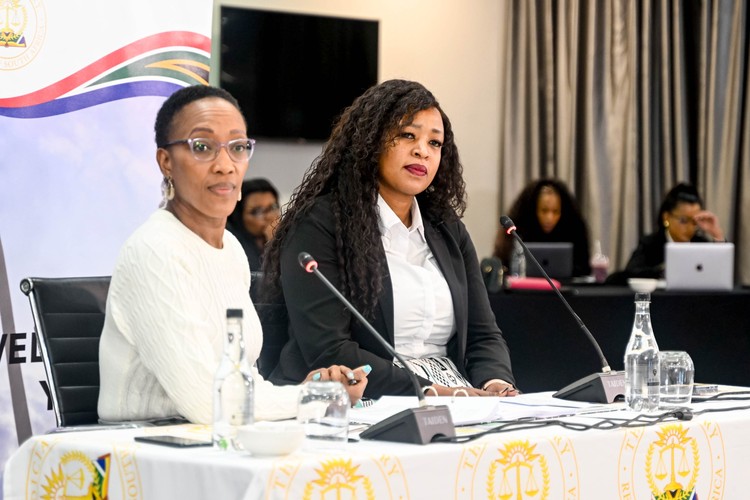
5 July 2025
Makhanda High Court stenographer Unathi Sogoni (right) and interpreter Lungiswa Ngaphi at the Judicial Conduct Tribunal probing allegations of sexual misconduct against Eastern Cape Judge President Selby Mbenenge. Photo: Office of the Chief Justice
The Judicial Conduct Tribunal probing allegations of sexual misconduct against Eastern Cape Judge President Selby Mbenenge rejected character evidence about his accuser, secretary Andiswa Mengo, on Friday.
While the details of what evidence was to be given by Makhanda High Court stenographer Unathi Sogoni were not made known, the panel, after considering two statements she had given, ruled that her evidence be disallowed.
During argument on the matter, evidence leader Salome Scheepers said comment that Mengo was a “seducer” had never been put to her in cross-examination.
Mengo has accused Mbenenge of sexually harassing her through a series of WhatsApp messages, including sexually explicit photographs and “stickers”.
Mbenenge claims their relationship was consensual. He admits sending some of the messages but specifically denies sending her a picture of his penis or asking her for oral sex in his chambers. Should he be found guilty, he could face impeachment.
When Sogoni took the stand on Friday, advocate Griffits Madonsela, for Mbenenge, attempted to introduce a letter written on 2 June in which he says Sogoni was accused of sending Mengo a “death threat”. But Scheepers said the letter did not identify any culprit.
Panel chair Judge Bernard Ngoepe firmly rejected any discussion of this. He said there had been an agreement that the “threats and counter threats” would not be aired before the tribunal, because they were being investigated by the police.
Sogoni began her testimony by saying she had worked at the Makhanda High Court since 2019. She said she and Mengo had been friends but were no longer, “because of the way she conducts herself and the way she treats other people”.
When Madonsela referred to two statements Sogoni had made, Ngoepe adjourned for the panel to read them. When Ngoepe and the panel returned, he said, “Large parts are hearsay evidence. It is evidence on the character of the complainant and the contents of these statements were not put to her when she was cross-examined.”
“And in a sense, it is technically irrelevant”.
Madonsela, however, argued that it was important to counter the evidence of gender based violence expert Dr Lisa Vetten “to the effect that Mengo was subjugated because of the power positions, her [Mengo] being a “child, secretary” and the JP, the judge and “a father”.
He said he would abandon any reliance on the rest of the contents of the affidavits and only focus on what Mengo had told Sogoni about “relations between secretaries and judges”.
“That is all I need to put on record, on what Ms Mengo understood to be the power dynamics and where power lay as she understood it. That is not hearsay evidence. She will talk about what Mengo directly said to her on that topic.”
He said Sogoni’s version had not been put to Mengo during cross-examination because the issue of “power dynamics” had only “arisen sharply” through Vetten’s expert evidence.
Challenged on that by Ngoepe, Madonsela changed tack and said the issue had been “embellished” by Vetten.
Ngoepe said Songoni’s affidavits did not deal with power dynamics but focussed on “Ms Mengo’s life, her sexual life”.
Scheepers submitted that the evidence was not relevant because “it is not the case that the complainant was a seducer, it was never put to her”.
Advocate Nasreen Rajab-Budlender, representing Mengo, said Vetten was an expert, Sogoni was not, and “this panel does not need to know about power dynamics from someone who has a fractured relationship with Mengo”.
After a further adjournment to consider the matter, the panel refused to hear Sogoni’s evidence.
On Monday, Mbenenge will begin his evidence. The tribunal is expected to continue until Thursday.